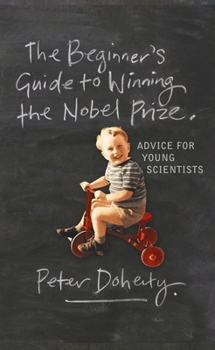The Beginner's Guide to Winning the Nobel Prize: Advice for Young Scientists
Select Format
Select Condition 
Book Overview
In The Beginner's Guide to Winning the Nobel Prize, Doherty recounts his unlikely path to becoming a Nobel Laureate. Beginning with his humble origins in Australia, he tells how he developed an interest in immunology and describes his award-winning, influential work with Rolf Zinkernagel on T-cells and the nature of immune defense. In prose that is at turns amusing and astute, Doherty reveals how his nonconformist upbringing, sense of being an outsider, and search for different perspectives have shaped his life and work.
Doherty offers a rare, insider's look at the realities of being a research scientist. He lucidly explains his own scientific work and how research projects are selected, funded, and organized; the major problems science is trying to solve; and the rewards and pitfalls of a career in scientific research. For Doherty, science still plays an important role in improving the world, and he argues that scientists need to do a better job of making their work more accessible to the public. Throughout the book, Doherty explores the stories of past Nobel winners and considers some of the crucial scientific debates of our time, including the safety of genetically modified foods and the tensions between science and religion. He concludes with some "tips" on how to win a Nobel Prize, including advice on being persistent, generous, and culturally aware, and he stresses the value of evidence. The Beginner's Guide to Winning the Noble Prize is essential reading for anyone interested in a career in science.Format:Paperback
Language:English
ISBN:0231138970
ISBN13:9780231138970
Release Date:May 2008
Publisher:Columbia University Press
Length:320 Pages
Weight:0.75 lbs.
Dimensions:0.9" x 4.9" x 7.6"
Grade Range:Postsecondary and higher
Customer Reviews
4 ratings
Nobel Prize
Published by Thriftbooks.com User , 18 years ago
Professor Peter C. Doherty was awarded the Nobel Prize for Physiology and Medicine with Swiss colleague, Rolf Zingerngel, in 1996 for discovering `the nature of the cellular immune defence', and was also recognised as Australian of the Year in 1997. Brief history of Noble Prize/s and autobiography of his childhood. Technical in places on immunology. A very informative read.
More than just a memoir of a prize-winner - and important to any aspiring scientist
Published by Thriftbooks.com User , 19 years ago
In 1996 author Peter Doherty found himself receiving the Nobel Price for Physiology or Medicine from the king of Sweden - an unlikely event for a boy who grew up in an Australian working neighborhood where his schoolmates ended up working in the local slaughterhouse. His journey from Australia, his evolving interest in immunology, and his eventual award-winning work are revealed in a memoir which surveys the life of a research scientist, discussing how scientific projects are selected, funded and organized. This approach makes this more than just a memoir of a prize-winner - and important to any aspiring scientist. Diane C. Donovan California Bookwatch
good reading
Published by Thriftbooks.com User , 19 years ago
It is not a How-To book to get the Super Prize, it is a journey of a Nobel Prize winner from his childhood to manage to get a nobel prize. I really like it
A Life in Science, its Rewards, Failings, and the Future
Published by Thriftbooks.com User , 19 years ago
This book is part memoir, part autobiography, part philosophy, and part several other things, and the result is a delightful read. The title needs to be taken just a bit in jest as no body can tell you how to win the big one. In science that's the Nobel, in sports its the Superbowl or World Series, in acting a Tony or Emmy. What the book can tell you is how the big one changes your life around. When the Nobel committee called to inform him that he was a winner they said, 'I'm going to give you ten minutes to call your families and friends before I release it to the press. After that expect the phone to be continuously busy.' In the case of the Nobel, a surprising number of people can't get back to the life of research they previously did, they are too busy making speeches and the like. Another part of the book is on the conflict between science and religion. Back in Galileo's day the Church had decreed that everything went around the Earth, the center of God's perfect universe. Looking through his home made telescope, Galileo saw that moons went around Jupiter. He was shown the instruments of torture and kept under house arrest for the remainder of his life. After this, astronomical research moved to areas not under the tight control of the church. Now it seems to be the time for biology to be held in contempt. There exists the possibility that religion will stop biology, at least in the United States, substituting faith in the Bible to replace observable facts. This is pretty scary in view of AIDS, bird flu, and other possible pandemics. Finally there is a section on What's Next. There are too many thoughts here that I can't even begin to do justice to them in a list. Lets just say that there are tremendous problems, tremendous opportunities.





